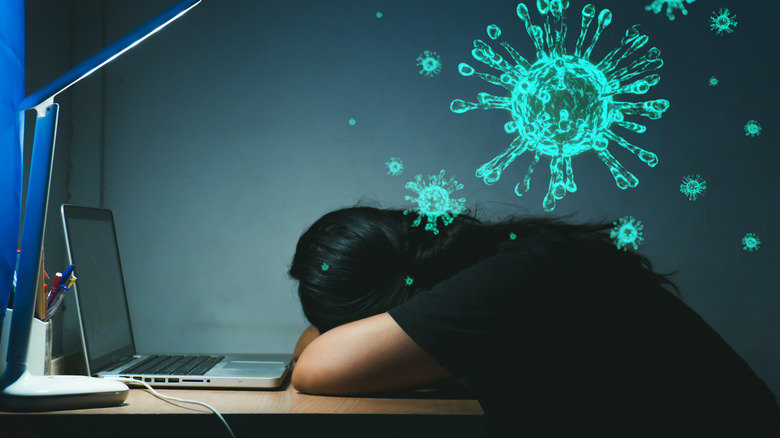What Really Happens To Your Body When You Pull An All-Nighter
Whether you're up all night studying, comforting a friend, or socializing, most of us are familiar with the feeling of pulling an all-nighter. The effects of staying up for 24 hours or more are surprising, and can impact your thought process, mood, and physical health.
An all-nighter is different from insomnia, which is when a person has the inability to fall asleep despite trying, according to the Sleep Foundation. All-nighters are voluntary — staying awake becomes a choice and is achieved through the use of a stimulant like caffeine, music, light, and activity.
Research has shown that staying up all night causes cognitive impairment similar to alcohol intoxication. After 24 hours without sleep, cognitive performance is similar to that of a person with a blood alcohol content of 0.10%, which is higher than the legal driving limit of 0.08%, according to a study published in Occupational and Environmental Medicine.
Staying up all night also corrupts our short-term memory bank, and gives us a higher chance of creating false memories. This can interfere with our memory recall even after we've recovered from the sleep deficit with a few good nights of rest.
You could be at risk of getting sick while pulling an all-nighter
In order to power yourself through a night without sleep, the body relies on the stress hormones cortisol and adrenaline, according to HuffPost. The increase in these hormones puts strain on the body, raising anxiety levels and causing difficulty sleeping when it is time to rest. This can kick off a cycle of interrupted relaxing and poor sleep.
Even one missed night of sleep disrupts the activity of your body's immune system. The body produces cytokines to ward off disease and illness, but lack of sleep stops their production. Without a night's rest, you're more vulnerable to infection.
And if you've pulled an all-nighter, you know that feeling of gnawing hunger. That's from an imbalance in the hormones leptin and ghrelin. Leptin suppresses appetite while ghrelin increases the desire to eat. During sleep deprivation, ghrelin levels rise and leptin falls, often leading to that late-night pizza order.
Regularly accruing a sleep deficit can put you at risk of a host of serious medical conditions, according to Sleep.org. Lack of sleep can lead to high blood pressure, stroke, cardiovascular disease, obesity, type 2 diabetes, and depression.
So, while the occasional all-nighter might be a necessary evil that you can bounce back from with a good night's rest, try not to make it a regular habit.

